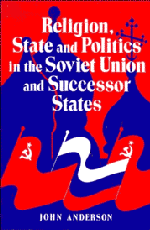Book contents
- Frontmatter
- Contents
- Acknowledgements
- 1 Introduction
- 2 Khrushchev: Towards a new assault
- 3 Khrushchev: Theory into practice
- 4 Brezhnev: Facing up to new challenges
- 5 Brezhnev and after: Combatting religion
- 6 Gorbachev and the liberalisation of religious policy
- 7 Religion, state and politics into the 1990s
- 8 Conclusion
- Bibliography
- Index
6 - Gorbachev and the liberalisation of religious policy
Published online by Cambridge University Press: 26 January 2010
- Frontmatter
- Contents
- Acknowledgements
- 1 Introduction
- 2 Khrushchev: Towards a new assault
- 3 Khrushchev: Theory into practice
- 4 Brezhnev: Facing up to new challenges
- 5 Brezhnev and after: Combatting religion
- 6 Gorbachev and the liberalisation of religious policy
- 7 Religion, state and politics into the 1990s
- 8 Conclusion
- Bibliography
- Index
Summary
If the Brezhnev years were notable for the absence of a distinctive religious policy, the same could not be said of Gorbachev's time in office. After a hesitant start, a wholesale liberalisation of religious policy began in the winter of 1987–8, and by 1991 it was possible to speak with little qualification of the existence of freedom of conscience within the Soviet Union. As the new approach to the religious question developed in late 1987 and subsequent years, two features of interest to our study emerged. Firstly, the fundamental shift in the nature of Soviet religious policy from a conflictual to a cooperative model. Religion was no longer an enemy to be combatted, but a potential ally to be enlisted in the struggle for reform. And secondly, the relative opening up of the whole process of religious policy making as debates were fought out in the public arena as well as behind closed doors. The process of change is the subject of this chapter, with particular attention devoted to the factors underlying the liberalisation of religious policy and the debates leading up to the adoption of a new All-Union Law on Freedom of Conscience in October 1990.
Gorbachev and the reform impulse
Clearly the impetus for change has to be located within the wider reform process intiated by Mikhail Gorbachev, though the example of the Khrushchev years served to demonstrate that political reform and the liberalisation of religious policy did not necessarily go hand in hand.
- Type
- Chapter
- Information
- Publisher: Cambridge University PressPrint publication year: 1994



